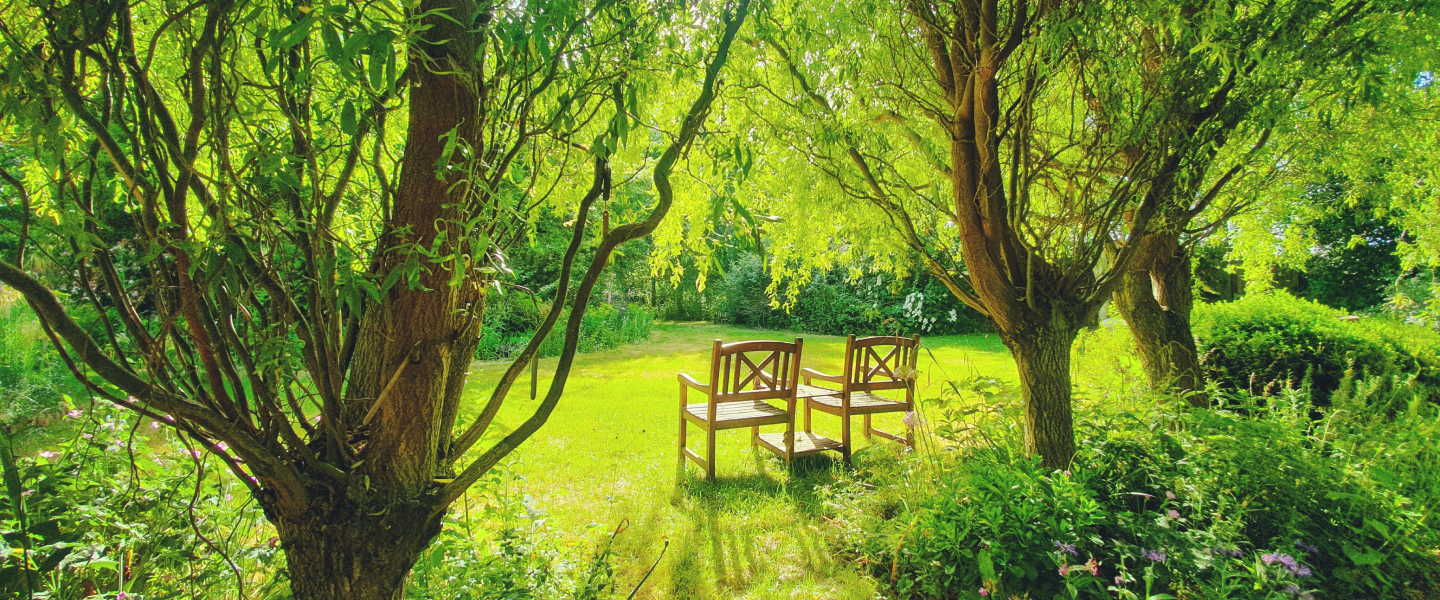
Our site and eco-gardens
Since 1995, our Earthworkers, supported by staff and volunteers, have transformed an area of waste land into 3.5 acres of beautiful, flourishing eco-gardens. We manage these gardens in an environmentally sustainable way and grow our plants using organic methods.
The Warren
Made of sustainably sourced oak, the Warren is the beating heart of Earthworks. Here, we meet daily, eat lunch and take part in crafts. Instead of connecting to the national grid, The Warren uses environmentally sustainable technologies, including solar panels to power lights and heat hot water, alongside a wood-burning stove to provide heating.
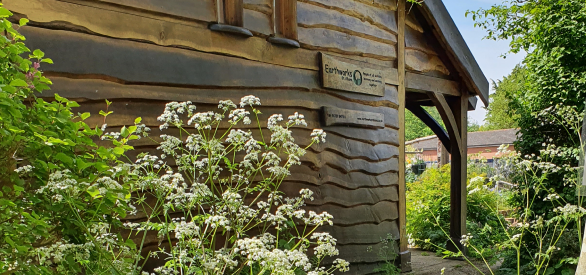
Our video tours
Earthworks: A Virtual Tour
Join us on a virtual tour of the beautiful Earthworks site (filmed in summer 2020).
What we love about Earthworks
In this video, our Earthworkers, staff and volunteers show and describe to you all of the things they love most about life at Earthworks!
Our sustainability values
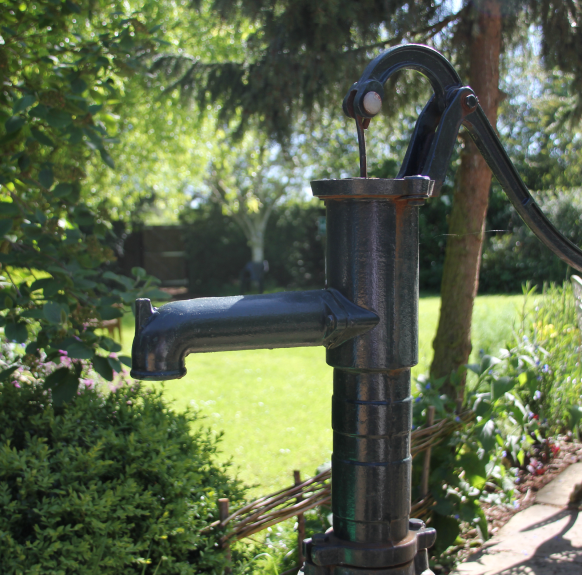
Water conservation
To conserve water, we have a 10,000-litre rainwater storage tank beneath our front lawn that collects rainfall runoff from the roof of the Warren and drainage from the car park. We paved over the tank with re-claimed stone to make an accessible patio where we can enjoy our tea-breaks outside. Construction and landscaping was led by the sustainable planning and design company, Ecovril, with many of our Earthworkers and volunteers helping to barrow, dig, connect pipe work and mix cement.
Water can be drawn up from the tank using an old fashioned cast iron hand pump to directly fill our watering cans, or pumped up and used to re-fill our other water butts in times of high demand. By watering our plants sparingly, we encourage drought-resistance so that our plants develop deep roots to reach water, rather than relying on our watering cans as a water source.
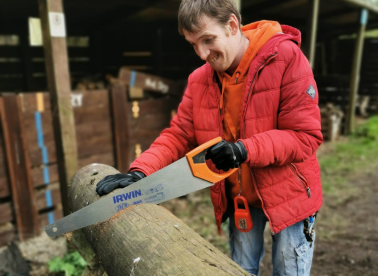
Recycling and repurposing
In line with our values of living sustainably, we try to recycle or repurpose materials rather than buying new. We use unwanted materials for crafting items such as our much-loved wooden reindeers that we sell at the St Albans farmer’s market at Christmas time.
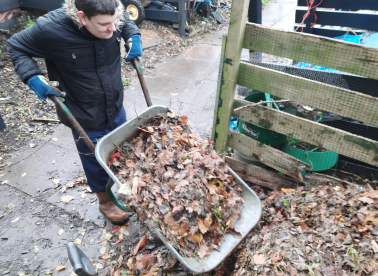
Composting
We produce our own compost; returning vital nutrients to the soil to sustain next year’s plants. All vegetative waste is composted in our large wooden bins; mixed and turned two to three times a year, ensuring an adequate oxygen supply for composting organisms. The compost is usually ready after around six months.
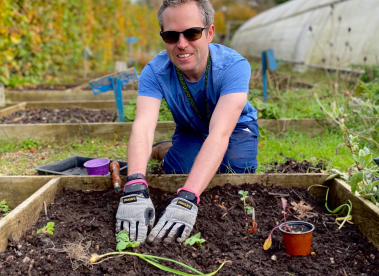
Organic growing
We grow our plants organically, using no artificial fertilisers or chemical pesticides. Instead, we use other methods such as companion planting; growing certain plants together in plant communities, to help us reduce pests and increase crop growth. Insect-friendly plants increase the pollination of crops, while strong-smelling herbs deter pests and legumes we have planted introduce nitrogen to the soil.
Play our relaxing video
Watch a day unfold in our eco-gardens in this slow video.
Our habitat
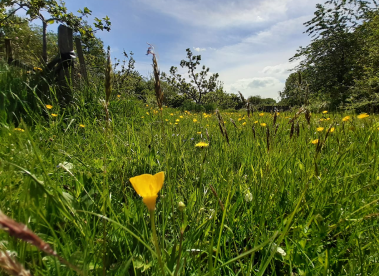
Wildflower meadow
We mow our beautiful wildflower meadow in rotation to allow butterflies to complete their lifecycles. This also provides a safe habitat for other wildlife, such as hedgehogs, and maintains a food source for our bees.
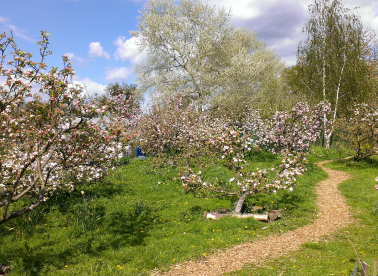
Heritage orchard
Planted at an Earthworks community event in 1996, our orchard contains thirty old varieties of fruit trees, including Brownlees Russet, Bushey Grove and St Albans. We prune and mulch the trees every year using our own compost and keep our branches low to ensure our Earthworkers can easily pick the fruit. After the autumn harvest, we produce delicious apple juice.

Beekeeping
Our bees pollinate our beans and fruit orchards, as well as producing our honey (which we sell at the St Albans farmer’s market). They live in innovative Dartington Long Deep hives, with an ergonomic design that allows people to get a close look at what is happening in the brood chamber. Our bees are kindly managed by St Albans and District Beekeepers’ Association.
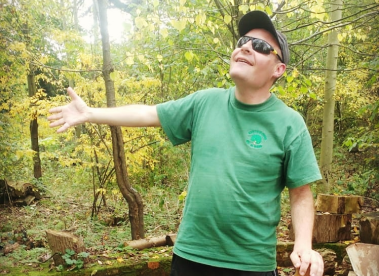
Native woodland
Our woodland area provides us with the necessary materials for our woodcraft activities, as well as providing a habitat for local wildlife.
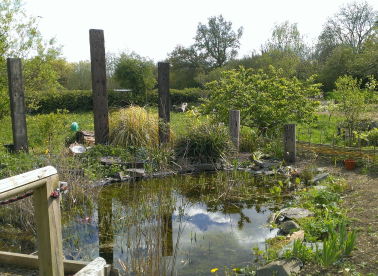
Ponds
We have two ponds, which host a variety of water plants and act as an important water source for local wildlife. Birds and frogs, attracted by the ponds, act as pest control by eating slugs and snails.

Hedge-laying
Traditional hedging acts as screening in our eco-gardens, planted and tended to by our volunteers. By opting for hedging over fencing, we have created homes for a variety of wildlife.
